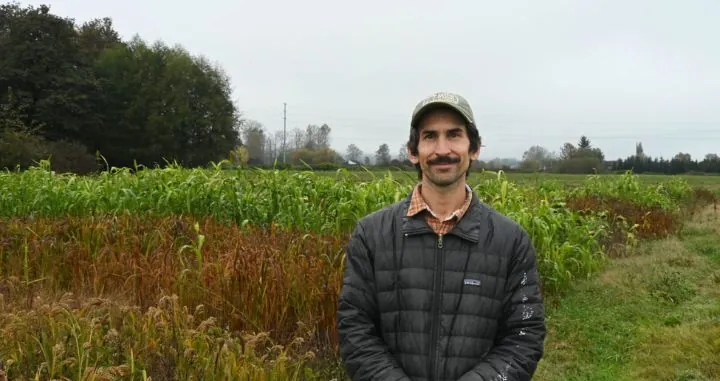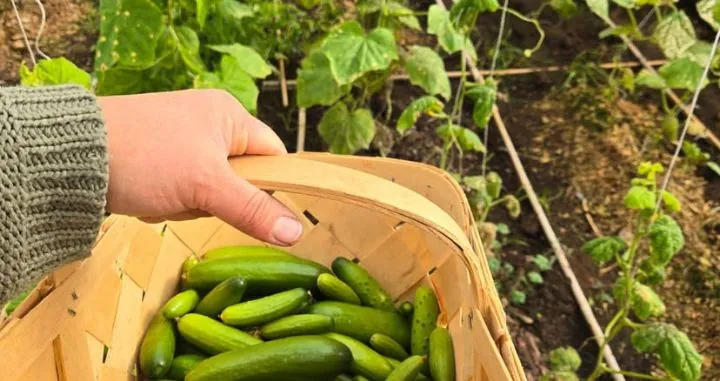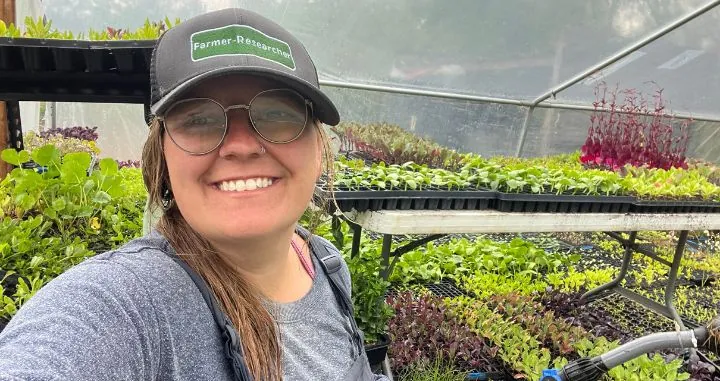Are you an organic or transitioning farmer or rancher who wants to test out a new agricultural practice on your farm?
OFRF’s Farmer-Led Trials Program provides farmers with technical assistance and support to investigate and learn about solutions to their most pressing production challenges. Read more to find out how you can be part of this program!
Our Commitment to Organic On-Farm Research
OFRF believes in supporting organic farmers and ranchers in their constant search for innovation and farm profitability. The Farmer-Led Trials (FLT) program puts farmers in the driver’s seat and recognizes their wisdom, experimentation, and problem-solving skills. Built in the spirit of curiosity and collaboration, this program supports farmers and ranchers in conducting impactful research that can address their unique challenges.
Organic farming and ranching takes dedication, financial investment, and a great deal of trial and error to adapt to a growing array of pest, disease, and soil health challenges. In order to address the challenges certified organic and transitioning-to-organic producers face, OFRF’s FLT program will provide support for on-farm learning trials aimed at testing new practices, inputs, varieties, or animal breeds that can improve profitability and environmental sustainability, leading to more resilient organic farms and ranches.
About the FLT Program
Research studies have shown that farmers greatly benefit when they lead on-farm research trials at their farms. Conducting your own research allows you to address your farm-specific questions, and has historically supported the adoption and innovation of sustainable agricultural practices across the world (Wettasinha, et al. 2014).
The goals of the FLT Program are to support farmers and ranchers in conducting practical, on-farm research that can address their farming challenges and to support farmer-led innovations in organic farming. Selected program participants receive comprehensive support from OFRF to assist in designing and implementing their on-farm trials and collecting and analyzing data.
Applications for the 2026 cohort are open until December 14, 2025. Apply today!
“The OFRF Farmer Led Trial program removes barriers for organic farmers to conduct research on strategies that can and will revolutionize farming.”
-Rhianna Simes, M.S.Ed, 2024 FLT program participant
Meet the Farmer-Researchers
In 2024 OFRF launched the first cohort of Farmer Led Trials. 10 farmer-researchers were selected to participate, including a mix of beginning farmers, BIPOC farmers, and veteran farmers spanning specialty crops, grain, and vineyard operations. All participants are certified organic or in transition to organic. The following series of blogs highlights the stories of these farmers and their research projects. In April of 2025 we announced the 2nd cohort of FLT Program participants. Their projects are currently underway.
Farmer-Led Trials Program Spotlight: Oxbow Farm and Conservation Center
Oxbow Farm and Education Center, in the Snoqualmie Valley of Washington, is a nonprofit focused on trialing climate adaptive and resilient agricultural practices. Farm manager, Anthony Reyes, is participating in OFRF's Farmer-Led Trial Program to experiment with seeding rates of cover crop for biomass and nutrient content.
Two Years of Farmer-Led Trials
As we wrap up the second cohort of Farmer-Led Trials, and prepare to open applications for the third season, OFRF’s Research & Education Program Manager, Mary Hathaway reflects on the lessons, challenges, and highlights of supporting farmers in conducting their own research trials.
Farmer-Led Trials Program Spotlight: The Woven Trifecta
The Woven Trifecta, located in Western Michigan, focuses on diversified vegetables for a CSA, local farmers market, as well as farm to school sales throughout the school year. Farmer Samantha Otto, is participating in OFRF's Farmer-Led Trial Program to experiment with using anaerobic fermentation as a soil amendment to improve crop vigor and yield.
The Farmers Guide to Conducting On-Farm Research
At OFRF, we know that farmers and ranchers are natural researchers. They regularly engage in a trial-and-error process to address their many questions and challenges. By incorporating a few scientific steps into on-farm trials, farmers can begin to generate more reliable results.
 The Farmers Guide to Conducting On-Farm Research was created to encourage farmers to develop and implement on-farm research trials. It provides a detailed, step-by-step tutorial laying out the seven major steps needed to conduct a successful on-farm trial, including design, implementation, data collection, and drawing conclusions, enabling you to assess the value of specific practice, variety, or input.
The Farmers Guide to Conducting On-Farm Research was created to encourage farmers to develop and implement on-farm research trials. It provides a detailed, step-by-step tutorial laying out the seven major steps needed to conduct a successful on-farm trial, including design, implementation, data collection, and drawing conclusions, enabling you to assess the value of specific practice, variety, or input.
The guide provides practical information, including examples from farmers and ranchers conducting on-farm research, links to additional resources, and worksheet templates for designing a sound research trial. It is available for free as a reference for any farmer or rancher wanting to conduct their own on-farm trials, not only those participating in the FLT Program. But it is a core component of the Farmer-Led Trials Program, and anyone applying for the FLT Program should familiarize themselves with The Farmers Guide first.
What farmers are saying about the program:
“The OFRF Farmer-Led Trial program offers an incredible opportunity for farmers to explore innovations we have developed. OFRF provides assistance to offset expenses of the project, and access to technical assistance from their trained professionals. This program has given me the courage and support I needed to pursue my research.”
-Rhianna Simes, M.S.Ed, 2024 FLT program participant
“By partnering with OFRF, not only do we get some support but we get to create a project that will help us determine the very best cover crops to solve some of our soil health issues. We get expert advice and feedback through all stages of the project from planning, implementing, data collection, and interpreting results.”
-Tim Colby, 2024 FLT program participant
“Working with OFRF has been an amazing opportunity for our farm. [It has] made a once intimidating idea very fun and feasible to trial This data will help us make decisions on how to incorporate ferments in our wider production in the future so that we can continue to grow beautiful, healthy, thriving vegetables for our community.”
-Samantha Otto, 2025 FLT program participant
Sign Up for Farmer-Led Trials Notifications
References
- Wettasinha C, Waters-Bayer A, van Veldhuizen L, Quiroga G and Swaans K. 2014. Study on impacts of farmer-led research supported by civil society organizations. Penang, Malaysia: CGIAR Research Program on Aquatic Agricultural Systems. Working Paper: AAS-2014-40.






